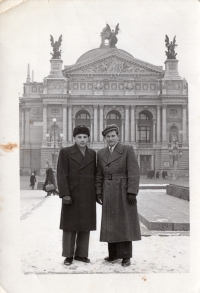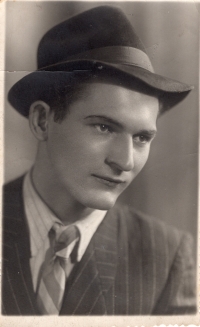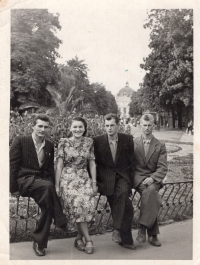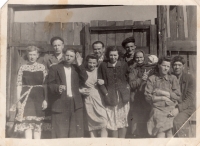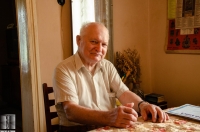In the 41st year, the war broke out, that is, began… began… did not begin, just a continuation of the war. And you know, at that time, when Germans entered Lviv, and that was on June 30, June 30, no, they entered Lviv sooner. For me as a child… It is interesting for a small child, when the war broke out, you know, and then our street that goes to the east… It was crowded with migrants. There were a lot of Russians in Lviv. And they all fled, you know, to the east. There were many of them… many… they were running away, you know, night and day, night and day, you know… They were leaving, running away from the Germans, they were running away. And when, you know, the Germans had already taken over Lviv, you know, there were Russian soldiers somewhere around. And, you know… and our people… our neighbors, mine especially, our neighbors were very, you know, interested: oh why, you know, how the Germans came and they are not greeted. And Ukrainians were very loyal to the German government, you know, at that time. And we all went out, you know, all of us… all the neighbors, all, everyone… 30 people, we went to Vilkina street, on the corner with Lychakiv, we went there to greet the Germans. Germans were on bicycles, on… and also driving by cars… They were standing on the left side, under that building, and my friend and I were standing on this side, on the right side, if you go outside. And suddenly, you know, there was a strong explosion, you know. It turns out that in Pasieki, it used to be "gasmare", it used to be a landfill… in Pasiky area, you know. There a Russian tank, you know, got stuck there. And they wanted to break through. It was already… it was already on the June 30… on the June, 30. On that day Stepan Bandera, you know, in… in the city center gave a speech, you know, there… He was proclaiming Ukraine. But that's just the point... And that tank wanted to break through, it had no identificational signs, there were no signs on it, it left Pasieky and moved to… to Lychakiv…
H.Z. And where is Pasieky located?
B.V. Pasieky is the area where the tram turns.
H.Z. Uh-huh.
B.V. And from that….
H.Z. Is it near the end stop of the tram number 2?
B.V. Yes, tram number two. And the tank, you know, it was driving from there, from the Pasieky district, and was driving fast to the right, it wanted… to Vynnyky… wanted, wanted to break through, you know. There were four of them. And there were only Jews, you know. Because now I'll tell you why. And when, you know, the tank arrived… at this place, there was "Yunist" workshop, here… a workshop "Yunist (Youth)", they were making knitwear there. It reached the "Yunist", the tankers saw through their window that there were many people standing with bouquets, and with direct guidance, you know, fired a round at… at people. Some people died immediately, you know, among them: my brother Yevhen, my brother-in-law, a neighbor, one more neighbor, Kalmu… Kalmukiv, yes, Blihard… well, in short, six people… six people. My brother-in-law, brother-in-law, bass… my brother, in short, six people died.

